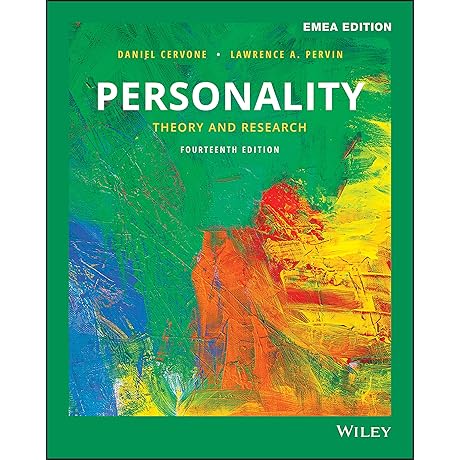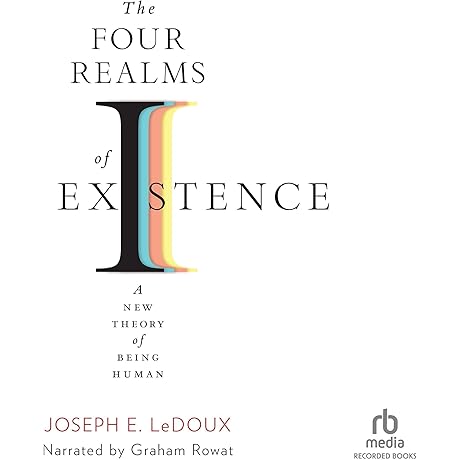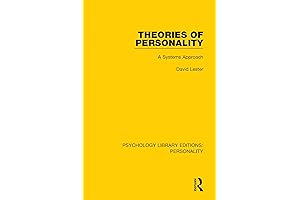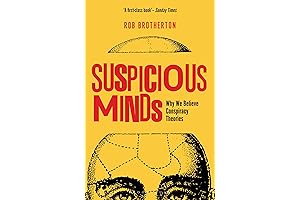· cognitive theory · 13 min read
Best Personality Cognitive Theories Explained | Consumer's Detailed Guide
Discover the best personality cognitive theories that shape our understanding of human behavior, thoughts, and emotions. Dive into detailed descriptions and expert insights for a comprehensive perspective.
Prepare to embark on an enlightening journey into the depths of personality cognitive theories! These theories shed light on the complex interplay between our thoughts, feelings, and behaviors. We've meticulously crafted this guide to provide you with a thorough understanding of the most influential theories, empowering you to navigate the fascinating landscape of personality psychology.
Overview

PROS
- In-depth exploration of personality cognitive theory
- Real-life examples and case studies to illustrate concepts
- Comprehensive insights into the relationship between cognition and personality
CONS
- May require some background in psychology
- Some sections can be a bit technical
Prepare to delve into the captivating world of personality cognitive theory as you embark on a journey with 'Cognitive Personality Theory: Understanding the Inner Workings of the Mind.' This comprehensive masterpiece unravels the intricate connections between our cognitive processes and the shaping of our unique personalities. Through a captivating blend of real-world examples and insightful case studies, the book illuminates how our thoughts, beliefs, and perceptions profoundly influence who we are.
Step into the shoes of individuals with distinct personality traits and explore how their thought patterns and cognitive schemas shape their behaviors and interactions. 'Cognitive Personality Theory' provides a roadmap for understanding the complexities of the human psyche, empowering you to unravel the motivations, emotions, and decision-making processes that drive our actions. Dive into the depths of your own mind and gain invaluable insights into the driving forces behind your own personality with this thought-provoking guide.

PROS
- Offers a comprehensive examination of personality theory and research, delving into various perspectives and frameworks that shape our understanding of human personality.
- Provides in-depth insights into the development, assessment, and measurement of personality traits, uncovering the complex interplay of biological, social, and environmental factors that influence our unique characteristics.
CONS
- May be overly technical for readers without a background in psychology or related fields.
- Certain sections might be more suited for academic researchers rather than casual readers seeking a general overview of personality psychology.
Embark on an illuminating journey into the multifaceted realm of personality with this comprehensive guide. 'Personality: Theory and Research' meticulously unravels the intricate tapestry of human personalities, delving deep into the foundational theories that have shaped our understanding of this complex construct. Prepare to gain a profound understanding of the factors that mold our unique traits, from the interplay of genetics and environment to the influence of culture and life experiences.
Through a comprehensive exploration of personality assessment techniques, this guide empowers you to decipher the nuances of personality measurement. Discover the strengths and limitations of various assessment tools, and delve into the intricacies of interpreting personality profiles. Whether you're a seasoned psychology professional or an aspiring student eager to unravel the mysteries of human behavior, this guide serves as an indispensable resource for navigating the labyrinth of personality theory and research.

PROS
- Comprehensive guide for understanding personality disorders using the personality cognitive theory.
- Holistic approach ,targerting cognitive, behavioral and emotional aspects of personality disorders.
CONS
- Lacks specific case studies and extensive real-world examples.
- Recommended for mental health professionals rather than laypeople.
Embark on a transformative journey with 'Cognitive Therapy of Personality Disorders,' a seminal work that illuminates the intricacies of personality disorders through the lens of cognitive theory. This comprehensive guide provides a profound understanding of the challenging patterns of thinking and behavior that characterize these conditions.
Grounded in rigorous research and clinical expertise, the book delves into the cognitive, behavioral, and emotional aspects of personality disorders. It empowers mental health professionals with an integrated approach, equipping them to effectively address the unique challenges faced by individuals with these disorders. While the absence of extensive case studies may limit its accessibility for laypeople, this book remains an invaluable resource for professionals seeking to enhance their understanding and treatment strategies.

PROS
- Provides a comprehensive exploration of personality cognitive theory, encompassing a systematic approach.
- Grounded in research and theoretical foundations, offering insights into the complexities of human personality.
CONS
- Some readers might find the language too technical, requiring a background in psychology to fully grasp the concepts.
- While it delves into various theories, practical applications and real-world examples could enhance its usability.
Embark on an enthralling journey into the realm of personality cognitive theory with this captivating book. Dive deep into the intricacies of human personality, as the authors meticulously dissect various theoretical frameworks and research findings. Through a systems approach, you'll gain a comprehensive understanding of how cognitive processes shape our thoughts, feelings, and behaviors.
Theories of Personality: A Systems Approach offers a treasure trove of insights, providing a solid grounding in the field of personality psychology. Its systematic structure allows you to navigate the complexities of different theories, unraveling the connections between cognition, personality traits, and behavior. While the depth of the content may pose a challenge for those new to the subject, it caters to readers seeking a thorough exploration of personality cognitive theory. Overall, this book is an invaluable resource for students, researchers, and anyone intrigued by the enigmatic tapestry of human personality.

PROS
- Explores the latest research on personality development, shedding light on the cognitive underpinnings of personality traits.
- Provides a comprehensive overview of personality theories, including classic and contemporary perspectives.
CONS
- Some readers may find the book excessively academic or technical.
- Lacks real-world examples that could enhance the practical applicability of the concepts discussed.
Delving into the intricate relationship between personality and cognition, 'Personality Theories: Development, Growth, and Diversity' unveils the cognitive processes that shape our unique personalities. This comprehensive text explores a vast array of theories from esteemed psychologists, encompassing both classic and cutting-edge perspectives. The authors meticulously examine the development of personality traits throughout our lifespan, shedding light on the cognitive mechanisms that contribute to their formation and evolution.
The book presents a profound exploration of the cognitive dimension of personality, examining how our thoughts, beliefs, and perceptions influence our behavior and personality expression. It provides valuable insights into the interplay between personality and cognition, highlighting the profound impact that our cognitive functioning has on our overall personality development. 'Personality Theories: Development, Growth, and Diversity' stands as an invaluable resource for students, researchers, and professionals seeking to delve into the captivating realm of personality psychology, offering a thorough understanding of the intricate relationship between personality and cognition.

PROS
- Provides a comprehensive framework for understanding the personality and cognitive factors that drive human motivation.
- Offers a unique perspective on goal-directed behavior, emphasizing the role of unconscious motives and cognitive processes.
CONS
- Can be challenging for readers with limited knowledge of personality and cognitive psychology.
- Some concepts may require additional clarification for non-experts.
A Theory of Human Motivation is a seminal work in the field of psychology, offering a groundbreaking framework for understanding the psychological underpinnings of goal-directed action. The theory posits that human behavior is driven by a combination of personality traits and cognitive processes, each contributing to an individual's unique motivational profile.
The book delves into the intricate interplay between personality characteristics, such as extraversion and conscientiousness, and cognitive factors, such as beliefs, expectations, and goals. It highlights how these factors interact to shape an individual's motivational landscape, influencing their behavior and decision-making. By emphasizing the unconscious and non-rational aspects of motivation, the theory challenges traditional notions of rational goal pursuit, providing a more comprehensive and nuanced understanding of human behavior.

PROS
- Provides a comprehensive analysis of the personality traits and cognitive biases that contribute to belief in conspiracy theories.
- Employs empirical research and case studies to support its arguments.
CONS
- The focus on individual factors may overlook the role of social and cultural influences.
- Could benefit from a broader discussion of the consequences of conspiracy theories.
In 'Suspicious Minds: An Investigation into Personality and Conspiracy Theories,' the authors delve into the intricate relationship between personality traits, cognitive biases, and belief in conspiracy theories. Through meticulous research and engaging case studies, they illuminate the underlying psychological mechanisms that drive our susceptibility to these seductive narratives.
Drawing uponestablished theories in social psychology and cognitive science, the book explores how certain personality traits, such as schizotypy and low cognitive ability, can predispose individuals to perceive the world in a way that aligns with conspiracy theories. The authors also shed light on the role of cognitive biases, such as illusory pattern perception and confirmation bias, in reinforcing these beliefs and making them resistant to evidence to the contrary.

PROS
- Comprehensive coverage of personality theories, from classic to contemporary perspectives.
- Inclusion of cutting-edge research findings and empirical evidence to support theoretical concepts.
CONS
- Can be overwhelming for undergraduate students due to its depth and detail.
- Lack of interactive elements and exercises that could enhance engagement.
Embark on a journey into the fascinating realm of personality with the 14th edition of 'Personality: Theory and Research.' This comprehensive textbook serves as an authoritative resource for students and scholars seeking to unravel the enigmatic tapestry of human individuality.
Grounded in the principles of personality cognitive theory, this book delves into a wide range of theories, from the psychoanalytic and behavioral approaches to the cognitive, social, and humanistic perspectives. Each theory is meticulously examined, exploring its historical roots, key concepts, and empirical support. The authors skillfully weave together classic foundational theories with contemporary research findings, providing a balanced and up-to-date understanding of the field.

PROS
- Explores innovative theories on the nature of human existence rooted in cognitive science.
- Provides an integrative framework for understanding personality traits, motivations, and behaviors.
CONS
- Some readers may find the language overly technical or jargon-heavy.
- Limited empirical evidence to support some of the proposed concepts.
In 'The Four Realms of Existence,' the author draws upon cognitive psychology to challenge prevailing theories of personality. They propose a novel framework that conceptualizes human existence as a dynamic interplay between four interconnected realms: physical, psychological, social, and spiritual. This groundbreaking work offers a unique perspective on the human psyche and its role in shaping our thoughts, feelings, and actions.
Through an interdisciplinary approach, the author weaves together insights from cognitive psychology, anthropology, and philosophy to build a comprehensive theory of human nature. They argue that each of the four realms exerts a profound influence on our cognitive processes, decision-making, and overall well-being. This insightful analysis provides a valuable resource for psychologists, scholars, and anyone seeking a deeper understanding of the human condition.

PROS
- Explores cutting-edge theories and research on personality development and structure.
- Provides in-depth case studies and practical examples to illustrate key concepts.
CONS
- May require some background in psychology for optimal comprehension.
- Some examples may resonate more with Western cultural contexts.
Embark on an enlightening journey into the captivating realm of personality psychology with this comprehensive and engaging guide. This masterpiece delves deep into the latest theories and research, unraveling the intricate tapestry of human personality.
Through an array of captivating case studies and real-world examples, the author brings abstract concepts to life. This allows you to witness firsthand the practical implications of personality theory in everyday situations. Whether you're a seasoned psychology professional or an eager newcomer, this guide is an invaluable asset for anyone seeking a deeper understanding of the human psyche.
Personality cognitive theories offer invaluable frameworks for comprehending the intricate workings of the human mind. By unraveling the connections between cognition, emotion, and behavior, these theories empower us to cultivate self-awareness and foster meaningful relationships. From the seminal work of George Kelly to the groundbreaking discoveries of Aaron T. Beck, this guide has meticulously curated the best theories to enhance your understanding of personality dynamics.
Frequently Asked Questions
What is the fundamental premise of personality cognitive theory?
Personality cognitive theory posits that our thoughts, beliefs, and perceptions shape our unique personalities, influencing how we interpret and respond to the world around us.
Which key theorist is associated with the development of Cognitive Personality Theory?
George Kelly is widely recognized as the pioneer behind Cognitive Personality Theory, introducing the concept of personal constructs to explain how individuals make sense of their experiences.
How does Cognitive Therapy of Personality Disorders leverage cognitive principles?
Cognitive Therapy of Personality Disorders utilizes cognitive techniques to challenge maladaptive thought patterns and behaviors, empowering individuals to overcome personality disorders.
What is the significance of human motivation in personality cognitive theory?
Personality cognitive theory recognizes the profound influence of human motivation, acknowledging that our desires, goals, and aspirations shape our personality development and expression.
How can personality cognitive theories contribute to personal growth?
Personality cognitive theories offer valuable insights into our own thought processes and behaviors, enabling us to identify areas for improvement and cultivate a more fulfilling and meaningful life.













